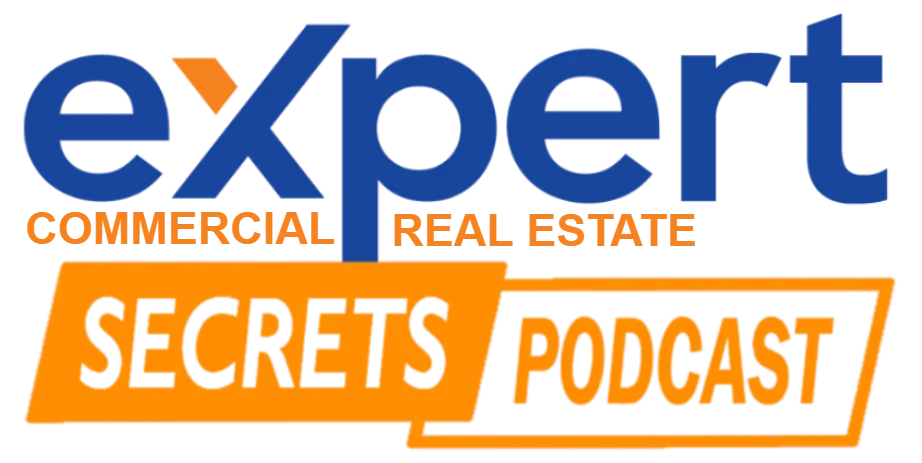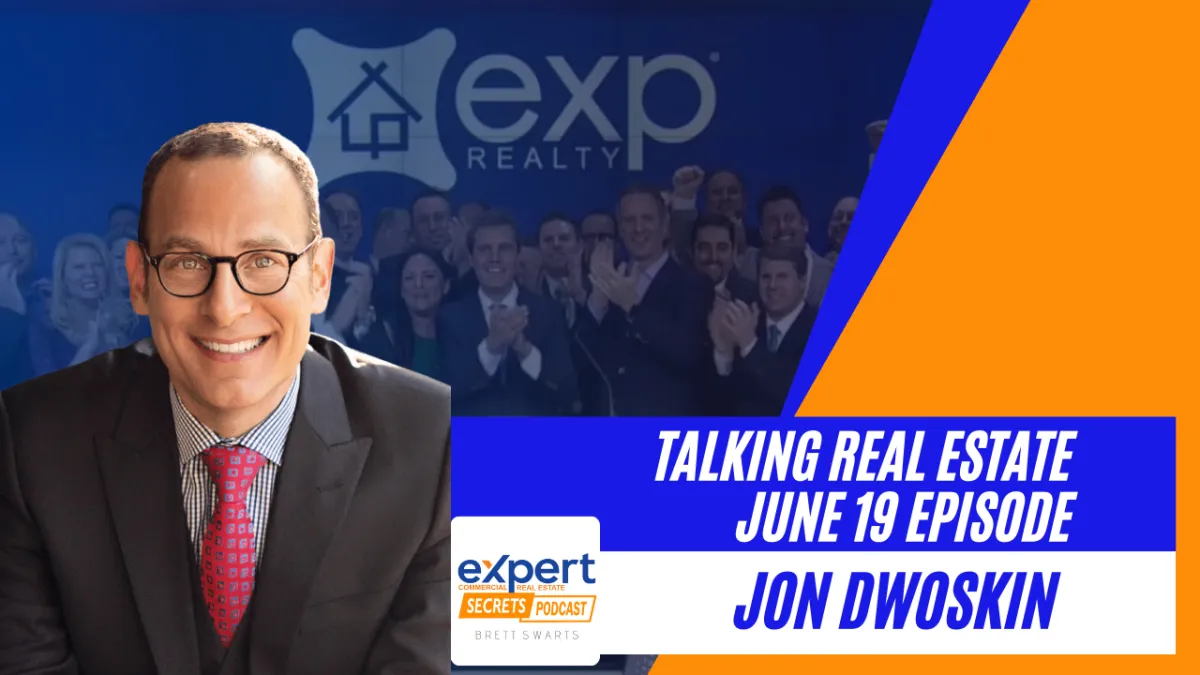
Talking Real Estate with Brett Swarts & Jon Dwoskin: June 19 Episode
November 25, 2021

“Any salesperson seems to fall into this pit of, cold calling in the beginning pipeline gets ramped up stopped prospecting.”
When Jon turned 43, he made a career out of being himself. He is an executive advisor, business coach, sales coaching, training, and management coaching, training keynotes, and Founder/Chief Executive Officer of The Jon Dwoskin Experience.
He's been called the “business whisperer” because he can see what you cannot see and hear what you cannot hear at your company. His passion extends to myriad non-profit organizations including sitting on the board of Hebrew Free Loan and, as an 18-year cancer survivor, being a mentor with Imerman Angels.
.
Watch the episode here:
Listen to the podcast here:
Talking Real Estate with Brett Swarts & Jon Dwoskin: June 19 Episode
Brett:
All right, everybody. Good morning or good afternoon, wherever you are listening. Today we are on our series of commercial real estate kind of general discussion as well as advanced at times a brokerage training. We're talking with Jon Dwoskin, and I'm Brett. Both of us are commercial real estate brokers and have lots of experience there, and also investors, as well. I'm also the founder of Capital Gains Tax Solutions, and I'm a multifamily broker with eXp Commercial.
Jon:
Formerly, broker formerly.
Brett:
You get your license up, Jon, what happened there?
Jon:
I still have my license. I saw my broker license. No, but I'm a business coach, but no, I saw my life. No, I kept my license for sure.
Brett:
Kept the license. That's a good point. I'm licensed and I am practicing, but my main focus is Capital Gains Tax Solutions, which people get challenged with the 1031 Exchange, and we solve that problem with our solution, and I'm selling a deal right now, 15 units multifamily, for a client Jon, that otherwise would not have sold if it wasn't for, for the deferred sales trust, and so we're here to just try to share some wisdom, try to give back and, and, and in, in hopes, you gain some insight here on ways to grow your business and your practice. Jon, we're talking all things fundamentals. When you think about commercial real estate brokerage fundamentals, what are some of the first two secrets or thoughts that come to mind?
Jon:
Whether it's commercial or even if it's residential, I think one of the things to think about are just the fundamentals of Daily Execution. I think there's a book I read a long time ago called Mastery, and it talks about living on the plateau and doing the same thing every day isn't necessarily always find. It's not always sexy. It's not always this, but knowing what your metrics are, that run your business on a day-to-day basis to prospect every single day, those things are so critical, and I think that's where a lot of people I mean, I know we're talking real estate, but any salesperson seems to fall into this pit of, cold calling in the beginning pipeline gets ramped up stopped prospecting. Well, that's a really backward way of looking at things, we need to be prospecting every single day, and whether it's, there are so many ways to prospect today, calls meetings are back, there's no networking's coming back, and texting, social media, there are all these different ways, and so we really got to know, what we want to make, and then reverse engineer what we have to do every day to make that happen, and that's the key. It's that consistency. Like really committing to the metrics, lowering the bar if you have to to be consistent, but being consistent is essential. But I don't know, what are your thoughts on that?
Brett:
I think you can't. You can't move forward if you don't have small, fundamental wins every day, and you're right, in commercial real estate, it starts with the cold call, and it starts with getting in those reps. It starts with understanding your marketplace. It could be reviewing the comps, reviewing who the buyers and sellers are, having, having good solid interest generation, you're calling somebody having something of value, all of those things prepare you right sharpening the saw, but if you're not getting out there, and calling and talking with people and discussing these things, and then, of course, listing properties and closing deals and going on meetings, then nothing goes anywhere, anywhere.
Everything I think rises and falls on sales and on your leadership as of yourself, and if you're not an organization that's not out there, prospecting and out bringing leads, everything else dies on the vine, you’ve got to get that ship off the ground or that the plane off the ground that ship out of harbored it takes that it takes a massive amount of inertia or force to get that going, and but you're right if you stop that and you stop consuming consistently on those things, then you can expect your metrics to fall off, and that is typically what we found, when we trained Marcus & Millichap was your call to get X amount of meetings and X amount of meetings lead to X amount of proposals and X amount of proposals, X amount of listings, and those amount of listings, that many amounts of closings, and then she can reverse engineer that on an average sales price of, a million to $3 million, let's just say on the left side, and representing both sides but, knowing those key numbers if you don't know those numbers and where you're going, then good luck having the motivation or the drive to do those disciplines.
Jon:
I remember I'm 49 years old as we record this, and when I was 18, my dad gave me a set of tape sets by Brian Tracy called the psychology of success, and he said, Jonathan, you'll learn more from these people than you will college. I went to college and, but, but I learned so much, and that's where I really started learning about prospecting. I mean, I have worked since I was 13. I didn't know if I knew the word prospect up until Brian Tracy started talking about how to talk to prospects. I became addicted to that type of learning. I mean, I've, there isn't a day that's gone by since I was 18. I haven't listened to all of these gurus, and now podcasts and books, etc. But my point, you have to study your craft, and so I've been studying prospecting since I was 18. Before that, I just didn't even know what it was. But I've been, but I've been studying it, and it is an art, and it's a science, and there are so many business people to talk about the art and the science of this and the other in the left brain and the right brain, and you can look at it from an EQ. You can look at it from a scientific standpoint. But at the end of the day, you have to study your craft, and I see so many.
As a business coach, I see so many leaders, owners, salespeople, managers, not studying their craft. I think it's very important for companies to offer training and things of that nature. But I think we also have a personal responsibility to study on our own. I mean, I've had, I'm a business coach, I've had a business coach myself for the last, 25 years, I have mentors, I'm reading every day, I'm studying every day, I'm listening to podcasts every day, I'm watching classes online every day, and even some days where it's maybe just for five minutes, there's still the ability and the ownership that I think is important to take regarding growth. Because what happens is, if you only rely on your company, which company should be doing way more training, but if you only rely on your company, then you only have that perspective, you only have that angle, and then it's really easy to talk, corporate-speak, and so I love when I hear these companies who do a ton of training.
Also bring in outside resources to train their people, because they understand that they outsource out so outside resources, who come in to train their people are giving them tools that don't make them sound corporate, they can interpret and give them something that really makes it a little bit more authentic, and so I think, for those who are listening to this, it's really, really important regarding we're talking about metrics and, staying connected. I think one of the ways you stay connected to your metrics is by always studying your craft. Not only internally what they provide, but on your own, you can everyday bring something new to the table. That’s what was my secret. I always enjoyed it. I always enjoyed prospecting and growing and growing a company, because every day I was learning so many new things because of my self-study. I could go and then implement it the next day versus just kind of rinse repeating like a robot.
Brett:
That we're talking about the fundamentals of Commercial Real Estate Brokerage, and I think knowing your metrics is number one, number two, is studying your craft, and likewise, my journey was not so much Brian Tracy, although he's amazing. I was born like Jim Rome, and just I remember hearing, learning about personal development and leadership and in the art of sales and the art of all the psychology behind it, and I'm going, like, why didn't somebody teach me this when I was younger? A and B, this is amazing wisdom, from so much. It was like another part of my brain opened up and then you're absolutely right. The other part you said about, ideas plus inspiration is what Jim Rome says, can lead to transformation. If you implement and take these things and make them your disciplines. Within your daily leadership development, personal development, sales development, and I think Brian Tracy says, well, like most people, don't study the art of sales. Most sales professionals just get out there and wing it. Maybe you've watched someone do this, but if you study the craft communication of sales of the pitch of the tone, as we talked about last week, you've been asking conditional, the conditional question to move forward with, how do we turn it again, Jon, the conditional close agreement. Where you're asking in a way, that's going to stimulate somebody to bring out the objections, and if you're not aware of this, you're not studying it, and then if we're not implementing it, then good luck getting traction on any part of your brokerage. What do you think, Jon?
Jon:
I mean, that's what we talked about last week. I think one of the hardest things to do, and if you and if you do it, or if you can't do it, it tells you kind of what went wrong in the initial conversation. But I think, I think to do it, we're talking about your study, and I'm saying I study the same people you studied. If you're not studying every day, then you can't grow your confidence in sales, and if you're not growing your confidence in sales, then it's really hard to always be taking it to the next level, so you see, at least what I see is a lot of hungry salespeople, but using the same lines, day after day, week, after week, year after year, and then they can't get out of their own way, and so I always go back to the how much are you growing as an individual, so you can get more comfortable and evolve to the harder things. Conditional clothes are so difficult, and no matter who teaches it to you, it's still difficult, because when you're in the moment and have to say it, that's what makes it really hard.
Brett:
Exactly, because you don't want to push too hard, too fast. We think as I think as salespeople and people in general, especially if you're a driver, personality, is very transparent and open land, at least for me, my personality type. It's like, I don't want to twist someone's arm. I just want to invite them in. But at the same time, unless you're drawing out those objections or those challenges, the customer may not even know. The client might not even know until you're asking and triggering that thought. Assuming we could agree on pricing terms, is there any reason you wouldn't move forward with X, Y, or Z, whatever you're proposing, and then the price, the fee, or the I can sell it myself or find me that up like first? Then I'll consider doing the deal, and then really clarify that you understand exactly what that is. I think the second part of that is not assuming, what they're saying is the heart of the matter. There's the art of the science of sales, of listening, which is a lost art usually, and understanding like, what's a true objection?
What's a symptom of maybe the root cause? Then try, and then draw that out with clarifying questions or mirroring. I mean, a gentleman that kind of a new part of my brain opened up as well. He says, never split the difference. He was Chris Voss. What he talks about is mirroring what someone has just said, the last few words, the last few thoughts of those things, and then asking, calibrated questions to, to really make sure you understand clarity, because I think, as a sales professional, if we get into the like, he said, You've been swinging the bat the same way, and you feel like you've heard it every single time. If you're not humble enough to say, maybe I'm not hearing it right or maybe I'm missing something, that he might not get to the heart of the matter. It's important to take each ad badly, or each place where you're setting up is a new opportunity and a new set of listening skills, and a new set of understanding and clarity. Before you offer that solution or that rebuttal. What do you think? What do you think about that, Jon?

Talking Real Estate: “Buy on the fringe and wait. Buy land near a growing city! Buy real estate when other people want to sell. Hold what you buy!” – John Jacob Astor
Jon:
I agree. I mean, I love everything you're saying. I don't know if I have too much to add other than, you laid it out well, I mean, piece pier you what you're laying out the fundamentals piece by piece, like a puzzle, and to me, whatever it looks, to me, anybody who's listening, it's all about understanding what your formula is, what your, what your puzzle is, what your five steps are, whatever you mean, name it, but the more you can figure out what that is for your DNA, the better it's going to be for you. That's really important. I love what you're talking about. I think the definition of insanity is doing the same thing repeatedly and expecting different results, and so to me, if you if we go and go to another layer of this, which is quantifying results if I'm making X amount of dollars repeatedly every year, sometimes one little tweak one little difference, I was just on the phone with the other client, and we revamped a bunch of stuff they were doing throughout their day, and he sent me a text, the way we revamped my day to is 10 times in my business already I can feel it. Because sometimes people get into a routine and a rhythm and a cadence that they think is working for them. But it is not. It is not, and sometimes it's off by just a hair. But that hair, you can quantify the 10s, if not hundreds, if not millions of dollars, it's costing somebody. I think it's really turning into you and I are talking about something that at a certain frequency and vibration, and I think it's important for people to figure out where their frequency and vibration is, figure out what their formula is, figure out what their step-by-step process is to learn specifically, and then evolve it and move it from that standpoint.
Brett:
That's why I think coaching is so important. Jon is here. Jon's my coach, and he helps me grow my business and look at those areas in and from outside, 30,000-foot view and then from a detailed micro-view, and make potential adjustments. It's like even Tiger Woods adjusted his swing in the prime of his career, and you go, and even Michael Jordan, as he aged, he changed his approach and his, his strategies and, and the way that he would approach the game, so having those coaches and those folks that are helping you see those things and challenge and accountability, and all those things that help all of us grow are so so important. Jon, we have about five minutes left. Any other thoughts besides knowing your metrics, and then studying your craft? Might be another law of the fundamentals of Commercial Real Estate Brokerage or sales in general.
Jon:
Courage. You got to have courage. You have to be able to ask for business. You got to be, and most people, we talk about, a lot of people don't study sales. Most people don't study for the task. How to ask for business and all the different layers, that all the different times where you can ask for a business where they are, many people will take it right up to the end zone, but they don't ask for the business, and then they wonder, Well, why didn't I get to deal? Well, you didn't ask, and so you can't assume that people are going to just know, some people may think you're not asking for a reason, you're too busy. You have too many clients. I mean, the list goes on and on. But they're also waiting for you to lead them and to ask them, and so I see a lot of people lose business because they just don't ask, does that mean that you know, if you ask, well, they say no? You need to have a couple of different tasks in your pocket. Because you're going to ask one way in one way on Facebook, one way on LinkedIn, one way an Instagram, one way on an email, one way over the phone, one way over text, you're gonna have all these different ways that you ask for business, and some of them are off just a smidge, and some of them are the same. But again, you got to study and know, you can pull off the shelf when you're ready.
Brett:
I love that, and I think part of the courage part is people are afraid of the no, and you can't be afraid of the No, and Grant Cardone’s said, set it well. I was training with him about 30 days ago, and he said don't say no, say maybe. If you're going to make the ask, and if the note does come up, it's a challenge back to the client or the prospect to the person who's talking with Don't say no, say maybe, and then the point of that is, let's find out what's below that. No, it's below that hesitation. What is the thing you're trying to solve? For that, do you feel like me? Proposing what I proposed is not going to solve that. I don't say no, say maybe, and now let's dive into that a bit, and look for another way to solve the problem or another part that wasn't as clear which I think next week if we dive into the fundamentals of the first listing appointment, and clarifying what that is for and what the proposal is for, if it warrants a proposal, understanding motivation, that'll be a teaser for next week, but don't say no, Jon, say maybe what you think about that.
Jon:
I don't know. Maybe I like it. Maybe I think I what I say when I hear that I want to make sure that people if they don't know, they say they don't know, I just know there's no confusion, and if I don't know anything if I don't know something I said, I don't know, I'll look into it, and I'll do the research, and but if I don't know if it's a no. Then, I don't know, I should use. I don't use that word a lot. That's not a go-to word. I'll keep my ears open on that one.
Brett:
I'll maybe get a better clip on that, and I'll send out an idea, and he's got a, he's got a strategy behind that. I'm still learning. But see it. I'm curious. You say it right. Just moving on.
Jon:
I love it. I love it. Listen to others, all these. You have to use words to make a big difference and know when to use the word and when not to use the word. Absolutely. No, I appreciate it. My closing thoughts are, as we end this week, just be brave, and be bold, and be courageous and study your craft. I have a ton of information that anybody can get on my website, jondwoskin.com and books, and ebooks and blogs, and it's all free. Dive in.
Brett:
Jon. Thanks, and if anyone wants to learn more about ways to eliminate the need for the 1031 exchange, also, we have Crypto Capital Gains Tax Mastermind, how to Defer Capital Gains Tax on crypto and be able to invest it into passive or active real estate, all tax-deferred. That's every Friday after the show we do at 10 am PST, and you can go to capitalgainstaxsolutions.com to learn more about that, and if you're interested in looking eXp Commercial, and the team that we're building, our vision is across the nation, every major city multifamily is our specialty for my background, and using the Deferred Sales Trust to grow your business. You can also go to expertcresecrets.com. We'll be back next week, Jon. I appreciate your time and wisdom today, and with that, make it a great week on Jon. Appreciate you.
Jon:
Thanks, everybody.
Brett:
Bye
SUBSCRIBE & RATE OUR PODCAST
⭐ ⭐⭐⭐⭐
on your preferred podcasting app.
important links:
love the show? subscribe, rate, review, and share!
⭐ ⭐⭐⭐⭐




